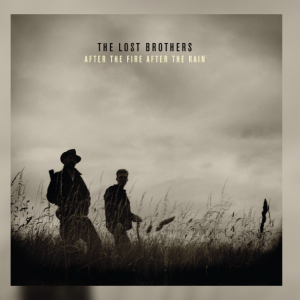They say you can tell a lot about a man by the company he keeps. Six fists of songs deep into their career, The Lost Brothers have built up a sizeable and formidable list of collaborators, from Brendan Benson of The Raconteurs to Richard Hawley to Glen Hansard.
That esteemed list continues to grow on ‘After The Fire After The Rain’, with Bob Dylan’s long-time bassist Tony Garnier on four-string and co-piloting production duties with Daniel Schlett (The War On Drugs, Steve Gunn). She & Him’s M. Ward guests on single Fugitive Moon, with further contributions from, amongst others, Giant Sand’s Howe Gelb and The Waterboys’ Steve Wickham.
Unsurprisingly, with such illustrious compatriots gravitating towards the songbook of Oisin Leech and Mark McCausland, there is plenty of sustenance to be found within. There are obvious comparisons to The Louvin and Everly Brothers due to The Lost Brothers sumptuous harmonies, but you are unlikely to find any of these songs on a karaoke machine anytime soon (if ever), as “After The Fire After The Rain“ is more interested in charting the precise moment darkness meets serenity than waking up Little Susie. In fact, this is the type of record that enters your consciousness by osmosis rather than by shock and awe.
Though the songs are heavily stylised in a modern Americana style, as if the illegitimate child of Joe Buck went in search of answers from Harry Nilsson. They very much centre around Irish concerns, with references to The River Boyne, Gortin Glen and the Hill of Tara, frequently questioning The Lost Brothers’ place in the world and the push and pull between their physical and spiritual homes, with a sombre sense that they will never truly be at peace since they cannot occupy both at the same time.
‘After The Fire After The Rain is a love-letter to home accidentally sent to the road, lovingly distilled by a formidable writing duo and a crack, A-Team of session musicians. This is not the type of record to occupy your Friday night, but rather endless Sunday afternoons drifting on a romanticised memory.

